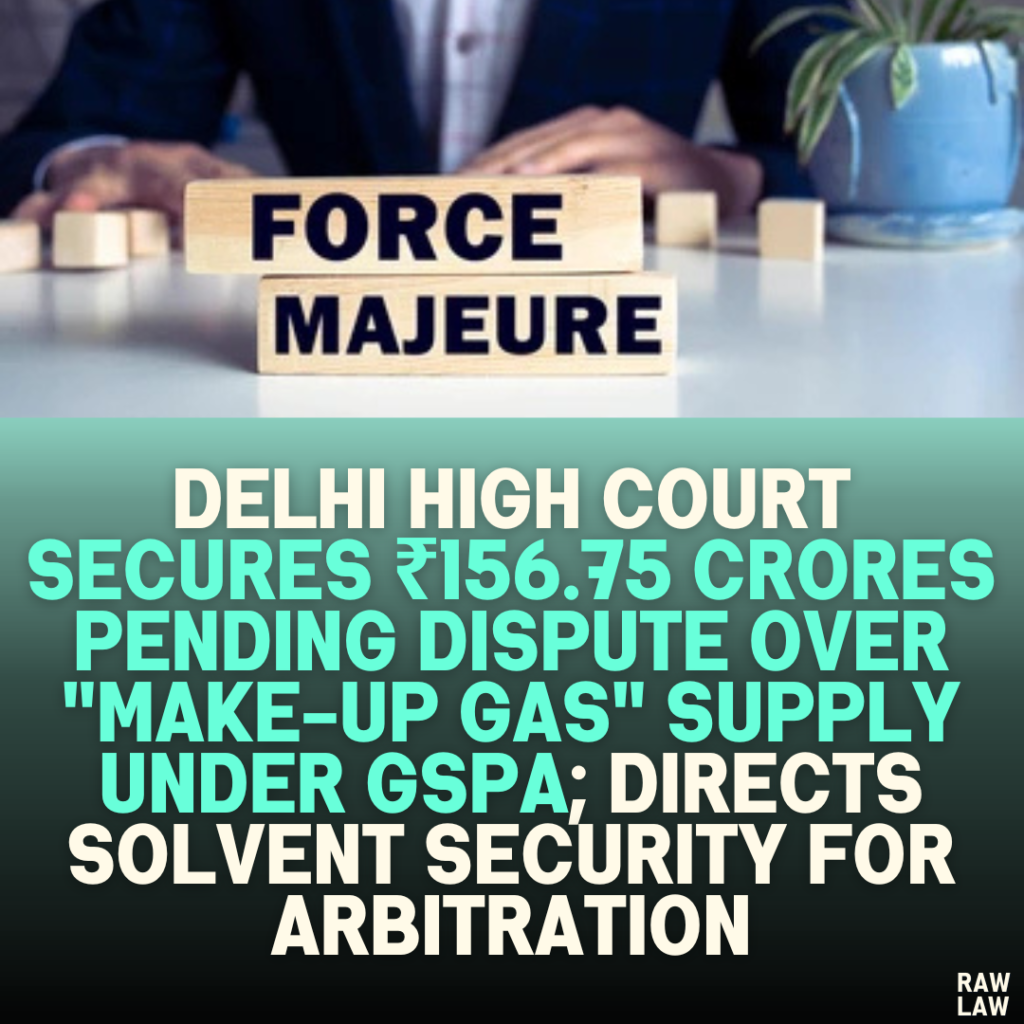Court’s Decision
The Delhi High Court directed the respondent to provide solvent security worth ₹156.75 crores in the form of either:
- A bank guarantee, or
- Unencumbered immovable assets.
This security ensures that any potential arbitral award in favor of the petitioner will be enforceable, preventing it from becoming a “paper award.” The security must be furnished within two weeks and will remain attached until the arbitral tribunal renders its decision.
Facts
- The GSPA Agreement: The petitioner and respondent entered into a GSPA in 2009 for the supply of natural gas from Block RJ-ON/6 to the petitioner, who supplied it downstream to Rajasthan Rajya Vidyut Utpadan Nigam Ltd. (RRVUNL).
- Expiration: The GSPA expired on September 30, 2024, with a four-month “restoration period” for fulfilling obligations like supplying “Make-Up Gas.”
- Payment Made: The petitioner paid ₹197.13 crores under an Annual Take or Pay (AToP) obligation from 2010-2015. A balance of ₹156.75 crores for unsupplied gas remained unpaid.
- Dispute: The respondent claimed an FM event (adverse reservoir behavior) led to reduced gas supply, discharging its obligations. The petitioner contested this, alleging non-compliance with the FM notification requirements.
Issues
- Make-Up Gas Entitlement: Does the petitioner have a valid claim for unsupplied Make-Up Gas or its monetary equivalent?
- Force Majeure (FM): Did the alleged FM event validly absolve the respondent from supplying gas?
- Restoration Period Compliance: Did the petitioner fail to off-take available gas during the restoration period?
Petitioner’s Arguments
- Non-Compliance with GSPA: The respondent failed to supply the agreed Daily Contract Quantity (DCQ) of gas, preventing the petitioner from fulfilling downstream supply commitments.
- Failure of FM Notification: The respondent’s FM notice was late and lacked detailed evidence, as required under Clauses 7.5 and 7.7 of the GSPA.
- Irreparable Loss: Without interim relief, the petitioner risks losing the ability to recover Make-Up Gas or its value, as the PSC governing gas extraction expired on August 20, 2024, with no formal extension.
- Financial Insecurity: Respondents Nos. 2 and 3 are foreign companies with limited assets in India, increasing the risk of unenforceable awards.
Respondent’s Arguments
- Contractual Constraints: The GSPA’s terms did not guarantee Make-Up Gas beyond the restoration period or provide for refunds of unpaid AToP amounts.
- FM Defense: Adverse reservoir behavior, a valid FM event under Clause 7.2(ii)(b), discharged its obligations. The petitioner accepted this by continuing to pay invoices from 2018-2024 without dispute.
- Petitioner’s Fault: The petitioner contributed to gas shortages by failing to off-take available gas, damaging wells, and causing operational inefficiencies.
Analysis of the Law
- Section 9, Arbitration and Conciliation Act, 1996: Courts can grant interim relief to preserve the subject matter of arbitration, provided:
- A strong prima facie case exists.
- The balance of convenience favors the applicant.
- Irreparable harm would result without relief.
- Essar House Case: Courts should secure the disputed amount without fully adjudicating the merits, ensuring enforceability of awards.
- Sanghi Industries Case: Interim relief akin to attachment before judgment requires cogent evidence of dissipation of assets.
Precedent Analysis
- Essar House (P) Ltd. v. Arcellor Mittal Nippon Steel India Ltd.
- Courts can secure disputed amounts without final adjudication if there’s a risk of diminished assets.
- Sanghi Industries Ltd. v. Ravin Cables Ltd.
- Courts must find specific evidence of dissipation to justify attachment orders.
- Adhunik Steels Ltd. v. Orissa Manganese and Minerals (P) Ltd.
- Section 9 relief should not prejudge the merits of the arbitral dispute.
Court’s Reasoning
- Prima Facie Case:
- The petitioner established a clear claim for ₹156.75 crores based on the GSPA and its payments under AToP obligations.
- The respondent’s FM defense lacked timely notification and clear substantiation.
- Balance of Convenience:
- With the GSPA expired and the PSC pending extension, the petitioner risked losing its claim if interim relief was not granted.
- The respondent failed to provide evidence of sufficient assets to satisfy a potential arbitral award.
- Irreparable Harm:
- The petitioner’s inability to recover Make-Up Gas or equivalent monetary value would lead to irreparable harm.
- Respondents’ Conduct:
- The respondents, being foreign entities, lacked sufficient assets in India, creating a risk of unenforceable awards.
Conclusion
The court directed the respondent to provide security of ₹156.75 crores, ensuring enforceability of any arbitral award. It clarified that its observations were limited to interim relief and would not influence arbitral proceedings.
Implications
- Judicial Intervention: Highlights the proactive role of courts in securing assets to protect arbitral awards.
- Force Majeure Clarity: Reinforces the importance of timely notification and evidence to invoke FM clauses.
- Risk Mitigation: Sets a precedent for securing claims against foreign entities in arbitration.
This decision showcases a balance between upholding contractual obligations and safeguarding the petitioner’s rights in arbitration.
